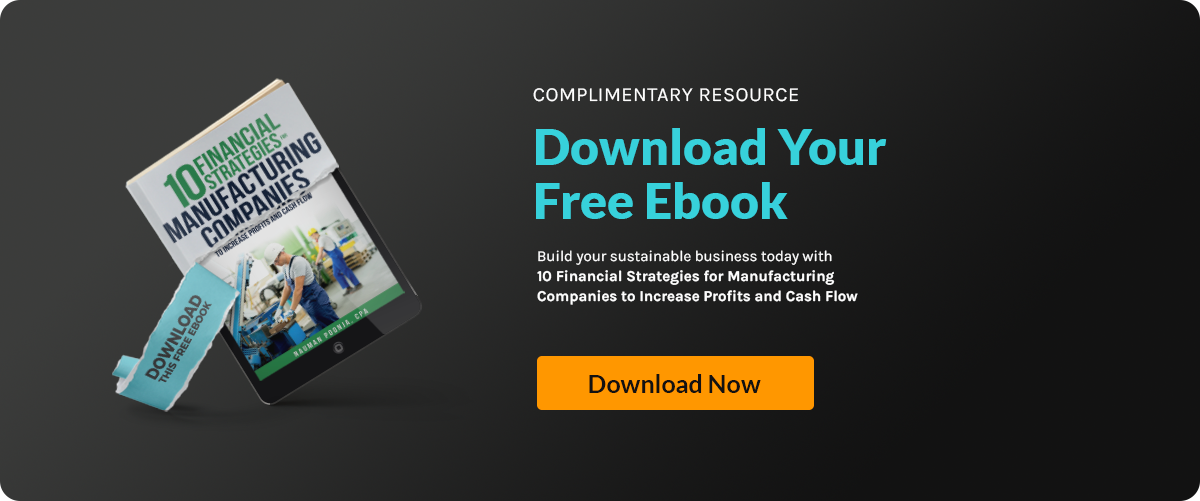Running a manufacturing business often means tight margins and heavy investment in equipment,...
Types of Manufacturing Insurance for Risk Management

Risks abound in manufacturing. Machinery breakdowns, supply chain disruptions, employee injuries, and product recalls can cripple production lines and devastate profits. Manufacturing insurance is crucial to managing these risks, ensuring business continuity, and safeguarding hard-earned revenue.
According to a survey by The Hartford, 40% of small businesses they were reported experiencing a business interruption due to a natural disaster, equipment failure, or cyberattack, with manufacturing companies particularly vulnerable.
Manufacturers need risk management solutions tailored to their specific operations. Questions like, "What happens if a critical machine fails?" or "How can we protect against a sudden supply chain disruption?" are at the forefront of every manager's mind.
How should they navigate the complexities of insuring machinery, products, and employees?
Which policies will best shield their business from potential lawsuits and losses?
Discover which policies will fortify your risk management strategy, how to tailor your coverage to meet specific needs, and why it's essential to understand the fine print.
What is Manufacturing Insurance?
Manufacturing insurance is a specialized type of coverage designed to protect manufacturing businesses against the risks and challenges they face in their daily operations. This form of coverage offers tailored solutions that cover a broad range of issues, including but not limited to equipment damage, product liability, workplace injuries, and business interruption. Because the needs of manufacturing businesses vary widely depending on the industry segment, products produced, and scale of operations, manufacturers' insurance must be highly customizable.
These tailored policies ensure that each manufacturing business can have coverage that precisely matches its risk profile, providing optimal protection and support. Thus, manufacturers' insurance is not just a generic policy but a critical strategic tool that supports the long-term stability and growth of businesses in this sector.
Importance of Production Downtime Coverage
Production downtime is a significant concern for manufacturers. Halting production can have serious financial consequences, whether due to equipment failure, supply chain issues, or unforeseen disasters. Production downtime coverage is crucial in protecting your business from the fallout of unexpected interruptions.
1. Financial Protection Against Revenue Losses
When production stops, so does the revenue stream. Even short interruptions can translate to significant financial losses. Production downtime coverage compensates for lost income, helping maintain your financial strength during disruption. It can cover ongoing expenses such as payroll, rent, and utilities, allowing your business to weather the storm.
2. Coverage for Fixed Costs
Fixed costs like rent, salaries, and loan repayments don't pause because production does. Coverage for manufacturers with production downtime coverage ensures that these essential expenses are covered, preventing a financial squeeze that could threaten the business's survival.
3. Employee Retention
Unexpected downtime can lead to layoffs or reduced hours for employees. This coverage helps maintain payroll continuity, preventing the loss of skilled workers and ensuring your team is ready to resume operations once production is back on track.
4. Risk Control and Management
A holistic approach to insurance includes risk control measures that can reduce the likelihood of prolonged downtime. Insurers often provide resources and guidance on risk control strategies, such as maintenance schedules, contingency planning, and supply chain management. Taking advantage of these resources can help minimize downtime exposure.
5. Employment Practices Liability Coverage
Employment practices liability coverage (EPLI) is essential to avoid legal complications arising from workforce reductions or changes in employment terms due to production downtime. EPLI helps your business manage claims related to discrimination, wrongful termination, and other employment practices. Including EPLI as part of your holistic approach to insurance coverage provides an extra layer of protection.
6. Supply Chain Disruption Coverage
In today's interconnected world, production downtime can result from supply chain disruptions beyond your control. Supply chain disruption coverage provides financial protection if your key suppliers face issues that impact your production. This policy ensures you're looking out for all facets of your operations, not just those within your control.
7. Equipment Breakdown Coverage
Mechanical failure is a leading cause of production downtime. Equipment breakdown coverage complements production downtime insurance by covering the cost of repairing or replacing vital machinery. Together, these policies form a comprehensive risk management strategy that helps your business avoid prolonged disruptions.
8. Natural Disaster Preparedness
Natural disasters like floods, hurricanes, and earthquakes can put production at a standstill. Production downtime coverage ensures your business can recover quickly by providing financial support for repairs, relocations, and ongoing expenses. Combining this coverage with a robust disaster preparedness plan offers a holistic approach to risk management.
9. Business Reputation Management
Production downtime can damage your business reputation, especially if customers experience delays or shortages. With production downtime coverage, you can maintain customer relationships by offering alternative solutions or compensating for delays. This helps preserve your brand's integrity and ensures customer loyalty.
10. Tailored Solutions for Unique Risks
Every manufacturing business faces unique risks, whether it's due to industry, location, or size. Production downtime coverage can be tailored to address specific vulnerabilities, providing peace of mind that your business is prepared for unexpected challenges. Customizing your coverage helps ensure that your business remains resilient in adversity.
Exploring Specialized Insurance Options
Navigating the complex landscape of risks involves securing specialized coverage options that cater specifically to their unique needs. Understanding the different types of business insurance available and how they can be tailored is crucial for protecting assets, employees, and the company’s financial future. Here’s an in-depth look at the options for manufacturing companies, including key aspects like manufacturing insurance costs and package policies.
1. General Liability Insurance
General liability insurance covers legal claims arising from bodily injury or property damage on your premises. It helps protect your business from lawsuits resulting from accidents like customer slip-and-falls or damages to a client's property. Without this coverage, manufacturers could face significant financial exposure from unexpected legal fees and settlements.
2. Property Insurance
Property insurance protects your manufacturing facility, machinery, equipment, and inventory against physical damage from fire, theft, or natural disasters. Manufacturers often rely on expensive machinery to produce their goods, so this coverage is vital to protect your business from costly repairs or replacements. Business interruption coverage, often included as an endorsement, compensates for lost income due to a covered event that halts production.
3. Product Liability Insurance
Manufacturers' insurance must include product liability coverage due to the potential exposure from faulty or defective products. This provides financial protection against lawsuits and claims resulting from injuries or damages caused by products you manufacture. Given the risks of recalls, lawsuits, and settlements, ensuring comprehensive coverage for this unique risk is essential.
4. Workers' Compensation Insurance
In manufacturing, employee injuries can happen despite stringent safety protocols. Workers' compensation insurance covers medical expenses and lost wages if employees are injured. This coverage helps protect your business from costly litigation and ensures compliance with state regulations.
5. Equipment Breakdown Insurance
Manufacturing relies heavily on machinery and specialized equipment. Equipment breakdown insurance covers repair or replacement costs when machinery unexpectedly fails due to internal mechanical issues. This also covers consequential losses, such as spoiled goods and business interruptions, helping to protect your business from significant revenue losses.
6. Business Interruption Insurance
Natural disasters, fires, or equipment failures can bring manufacturing operations to a halt. Business interruption insurance compensates for lost income during downtime and can cover ongoing expenses like rent and payroll. This coverage is crucial for manufacturers, as prolonged production halts can severely impact profitability.
7. Cyber Liability Insurance
With increased reliance on technology, manufacturers face unique risks related to data breaches, system hacks, and ransomware attacks. Cyber liability insurance covers costs associated with data recovery, legal fees, and customer notifications. As cyber threats continue to rise, this is increasingly vital for protecting your business.
8. Inland Marine Insurance
Manufacturers often transport goods and equipment overland to distribution centers, clients, and storage facilities. Inland marine coverage provides transit goods coverage, protecting against losses due to theft, accidents, or other damages during transportation.
9. Commercial Auto Insurance
Commercial auto protection is necessary if your manufacturing business owns vehicles for transporting goods or employees. This coverage includes liability for injuries and property damage and can cover repairs to company-owned vehicles.
10. Umbrella Insurance
Umbrella insurance provides additional liability coverage above and beyond the limits of your other policies. It helps protect your business from significant financial exposure from catastrophic lawsuits or settlements exceeding your primary coverage.
Safeguarding Manufacturing Assets for Effective Risk Management
Safeguarding assets is essential for mitigating risks and ensuring operational continuity in the manufacturing sector. Manufacturing businesses face unique risks, including equipment failures, supply chain disruptions, and safety hazards, which can jeopardize productivity and profitability.
Implementing comprehensive risk management strategies is crucial to protecting against these unique risks. Whether your business specializes in high-tech electronics or industrial machinery, having robust insurance coverage and safety protocols is vital.
These measures protect manufacturing businesses from potential financial losses and ensure that they can maintain a competitive edge in the market by minimizing downtime and preserving asset integrity. Adequate asset protection forms the cornerstone of a resilient manufacturing operation, securing its future against unforeseen challenges.
Secure Your Production's Future with Accounovation!
At Accounovation, we understand the manufacturing sector's unique challenges, especially regarding safeguarding assets and managing risks effectively. Our expert CFOs are committed to enhancing your financial strategy, optimizing cash flow, and boosting profitability, all essential components of robust risk management.
Beyond financial guidance, our Controller services are tailored to strengthen your risk management framework by providing accurate, data-driven reports. By implementing advanced financial controls and automation systems, Accounovation saves you time and fortifies your business against uncertainties, helping you focus on growth and success in the competitive manufacturing landscape.
Connect with us at Accounovation to get a free quote. Let us transform the way you manage risk and safeguard your assets.
Frequently Asked Questions
Why is manufacturing insurance important?
Manufacturing protection helps safeguard your company from financial losses caused by unforeseen events such as natural disasters, machinery failures, and legal claims.
How can manufacturing insurance protect my business?
This protection can mitigate various risks, including general liability, property damage, business interruption, and employee injuries, ensuring business continuity and financial stability.
What types of policies do manufacturing companies need?
Manufacturing companies need a mix of policies, including general liability, property, product liability, workers' compensation, and business interruption.
What is general liability insurance for manufacturers?
General liability protection safeguards against claims of bodily injury or property damage on your business premises or due to your business operations.
How does workers' compensation insurance help manufacturers?
Workers' compensation provides for medical expenses and lost wages if employees are injured, protecting the business from litigation.
What is product liability insurance?
Product liability covers legal claims arising from injuries or damages caused by faulty products you manufacture.
How can business interruption insurance benefit my manufacturing business?
Business interruption protection compensates for lost income and ongoing expenses during periods when your business cannot operate due to a covered event, such as a natural disaster or equipment failure.
What is equipment breakdown insurance?
Equipment breakdown protection covers the cost of repairing or replacing machinery that fails due to internal mechanical issues, protecting your business from significant revenue losses.
How can cyber liability insurance help manufacturers?
Cyber liability protection covers costs associated with data breaches, system hacks, and ransomware attacks, safeguarding your business from cyber threats.
What is inland marine insurance for manufacturers?
Inland marine policies provide for goods and equipment transported overland, protecting against theft, accidents, or damages during transit.
Why do manufacturers need commercial auto insurance?
Commercial auto policies cover liability for injuries and property damage caused by company-owned vehicles and repairs to the cars themselves.
What is umbrella insurance for manufacturing businesses?
Umbrella policies provide additional liability protection beyond the limits of your other policies, shielding your business from significant financial exposure due to catastrophic lawsuits or settlements.
How can I tailor my manufacturing insurance?
Work with a provider to assess your unique risks and customize your policies to match your specific needs, ensuring comprehensive protection for your business.
What is employment practices liability insurance?
Employment practices liability covers claims related to employment issues such as discrimination, wrongful termination, and other employment practices, protecting your business from legal complications.
How does insurance and risk management help manufacturing businesses?
Protection and risk management help identify and mitigate risks, providing tailored solutions to safeguard against unique exposures and ensuring the long-term stability of your manufacturing business.
Can small manufacturing businesses get manufacturing insurance?
Small manufacturing businesses can get tailored protection solutions that fit their specific needs and budget.
What should business owners look for when manufacturing insurance policies?
Business owners should look for comprehensive policies that protect against various risks, including property and casualty, liability, business interruption, and equipment breakdown.
How can manufacturing insurance help with global exposures?
Manufacturing policies can include protection for global exposures, helping safeguard your business against risks associated with international operations and supply chains.
How can I get a quote for manufacturing insurance?
Contact a provider specializing in manufacturing policies to get a quote tailored to your specific business needs and protection requirements.







